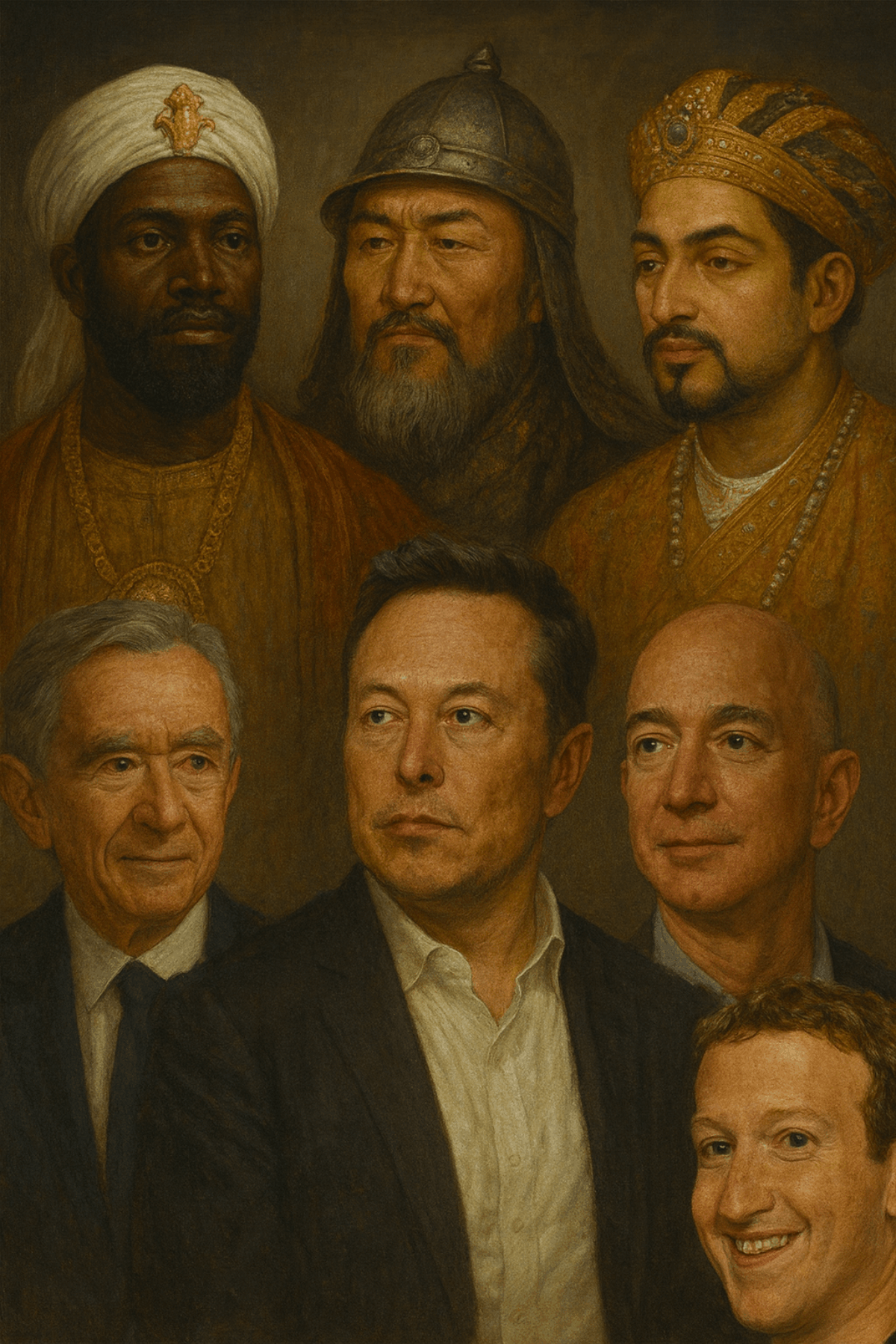MODERN BILLIONAIRES AND ANCIENT TRILLIONS

Musk’s staggering fortune pales in comparison historically.
For the record, and contrary to what my children believe, I am not a billionaire, and unless I win the lottery, I never will be. I thought I’d get that out of the way before going further.
Bernard Arnault, the French luxury magnate behind Louis Vuitton and Sephora, is officially the wealthiest man alive, with an estimated fortune of $233 billion. Nearly a quarter of a trillion dollars.
Put that into perspective: if Arnault spent $638 million every single day, he would still have money left by year’s end. If he spent $2.3 billion annually, it would take him more than a century to exhaust his fortune. His staggering wealth is just one of many at the top of today’s billionaire ladder, which includes Tesla’s Elon Musk ($195B), Amazon’s Jeff Bezos ($194B), Facebook’s Mark Zuckerberg ($177B), and Oracles, Larry Ellison ($141B). Their combined fortunes could build entire nations.
Their combined fortunes, however, would not total the amount of any one of history’s seven great men achieved single-handedly.
Even the so-called robber barons of America’s Gilded Age — John D. Rockefeller and Andrew Carnegie — were worth more when adjusted for inflation, yet they still do not compare. Rockefeller’s fortune peaked at roughly $305 billion in today’s dollars, while Carnegie amassed around $281 billion. They dominated oil and steel, shaping America’s industrial rise and leaving behind libraries, universities, and institutions that endure to this day.
Take Mansa Musa, emperor of Mali in the 14th century, whose kingdom produced so much gold that when he made his pilgrimage to Mecca in 1324, the gold gifts he handed out destabilized entire economies for a decade. Or Genghis Khan, who commanded an empire of some 25 million square miles and controlled the Silk Road; his fortune, in modern estimates, exceeded $100 trillion. In India, Akbar the Great presided over a realm that generated a quarter of the world’s GDP in the sixteenth century, a level of influence no individual could hope to wield today.
Other names stand among this exclusive company. Augustus Caesar, Rome’s first emperor, amassed a personal fortune rivaling the empire’s treasury, estimated at $4.6 trillion in today’s money. Amenhotep III, Pharaoh of Egypt’s 18th dynasty, ruled during one of the wealthiest periods in Egyptian history, with resources measured in the trillions. King Solomon, famed for wisdom and riches, reportedly received 25 tons of gold annually, his fortune valued at over $2 trillion. Some historians argue that Joseph Stalin, by controlling the entire Soviet state and its resources, effectively wielded the wealth of a trillionaire.
These men didn’t just accumulate wealth; they bent entire civilizations to their will. Their riches were measured not only in numbers but in their ability to dictate the price of gold, control global trade routes, or commission monuments that still shape landscapes today.
By comparison, today’s billionaires can buy elections, companies, or even rockets, but their power remains tethered to markets and shareholders. Arnault’s handbags, Musk’s satellites, and Zuckerberg’s platforms influence culture, yes, but they are still small shadows cast against the caravans of Musa, the conquests of Khan, or the treasuries of Caesar and Solomon. By some modern estimates, even Russia’s Catherine the Great and China’s Empress Wu topped a trillion dollars.
It’s mesmerizing to see today’s billionaires as unmatched in their wealth. Yet history shows there were others with even more money. Imagine a great hall where the richest people of all time sit at one long table. Arnault, Musk, Bezos, and Zuckerberg arrive with their billions — vast by modern standards, but in this great hall strangely small. Across from them, Mansa Musa glitters in gold, Genghis Khan rules over empires, Akbar speaks with the voice of a quarter of the world’s GDP. Augustus, Amenhotep, and Solomon sit atop the treasures that built civilizations. The modern billionaires glance at each other, realizing that their glass towers and rockets look like toys beside these monuments of power. The contrast is sobering: today’s wealth dazzles, but yesterday’s wealth ruled.
When headlines proclaim who is “richest in the world today,” it’s worth remembering: in history’s grand accounting, they are merely wealthy, but not legendary. In wealth as in history, the true giants are measured not in dollars, but in the civilizations they shaped.
